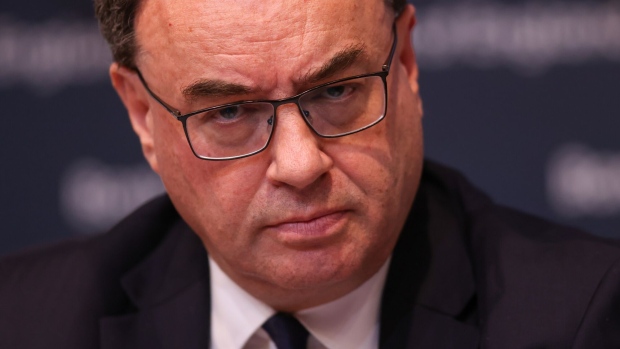May 17, 2023
BOE’s Bailey Warns of Risk of Inflation Persistence in UK
, Bloomberg News

(Bloomberg) -- Bank of England Governor Andrew Bailey said he was “unwavering” in his commitment to the UK’s 2% inflation target, as he warned that higher food prices and a tight labor market could cause the cost-of-living crunch to persist.
Speaking at the Global Annual Conference of the British Chambers of Commerce on Wednesday, Bailey said inflation was due to fall sharply from its current 10.1% level “over the coming months,” as lower energy costs helped to bring the headline rate of price rises down.
https://t.co/0Z2SuhbPDp pic.twitter.com/ZQdxMenMER
— Bloomberg UK (@BloombergUK) May 17, 2023
But in a question-and-answer session following his speech, Bailey said the “unprecedented times” in which the UK economy currently found itself were the “biggest test” yet of the inflation-targeting regime.
He noted that food price inflation was still extremely high, and while food producers expect costs to moderate, there was uncertainty around how long it would take for this to feed through into consumer prices.
The tight labor market was also adding to inflationary pressures, Bailey added, as workers tried to make up for lost spending power by bidding up their pay.
“The easing of labor market tightness is happening at a slower pace than we expected in February, and the labor market remains very tight,” Bailey said in a text of his speech released by the Bank on Wednesday.
“While we expect CPI inflation to fall quite sharply as energy costs begin to ease, albeit at a somewhat slower pace than projected in February given the near-term outlook for food prices, the outlook for inflation further out is more uncertain and depends on the extent of persistence in wage and price setting.”
Following last week’s 25 basis-point rise in the Bank’s base rate, taking it to 4.5%, Bailey said on Wednesday that the Monetary Policy Committee would continue to tighten “if there were to be evidence of more persistent pressures.”
The MPC has one more set of labor market data and two sets of inflation data from the Office for National Statistics to analyze before its next rate-setting meeting in June.
On the labor market side, Bailey said his colleagues would be watching closely for any signs that wages were rising faster than expected, or that job vacancies were remaining uncomfortably high.
On the inflation side, he said the MPC would be keeping an eye on core inflation - which excludes energy and food yet has still been running hotter than predicted, driven by so-called “second round” effects.
Read more:
- Chief Economist Hopes Bank of England Has Done Enough With Rates
- BOE Chief Economist Says UK Inflation at ‘Turning Point’
- BOE Says 1.3 Million UK Borrowers Brace for Higher Mortgages
(Updates with further comments from Bailey’s speech)
©2023 Bloomberg L.P.





